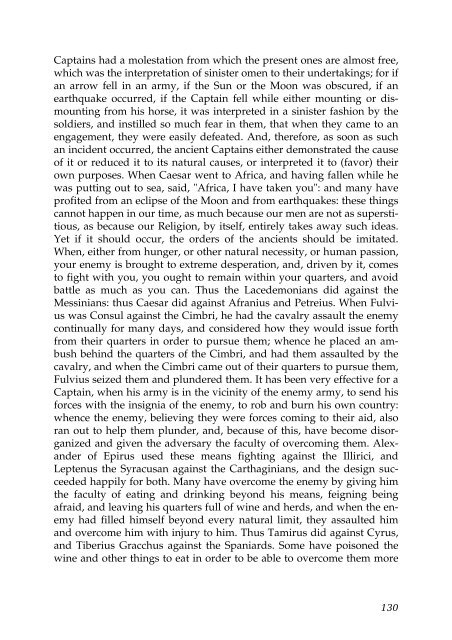Create successful ePaper yourself
Turn your PDF publications into a flip-book with our unique Google optimized e-Paper software.
Captains had a molestation from which the present ones are almost free,<br />
which was the interpretation <strong>of</strong> sinister omen to their undertakings; for if<br />
an arrow fell in an army, if the Sun or the Moon was obscured, if an<br />
earthquake occurred, if the Captain fell while either mounting or dismounting<br />
from his horse, it was interpreted in a sinister fashion by the<br />
soldiers, and instilled so much fear in them, that when they came to an<br />
engagement, they were easily defeated. And, therefore, as soon as such<br />
an incident occurred, the ancient Captains either demonstrated the cause<br />
<strong>of</strong> it or reduced it to its natural causes, or interpreted it to (favor) their<br />
own purposes. When Caesar went to Africa, and having fallen while he<br />
was putting out to sea, said, "Africa, I have taken you": and many have<br />
pr<strong>of</strong>ited from an eclipse <strong>of</strong> the Moon and from earthquakes: these things<br />
cannot happen in our time, as much because our men are not as superstitious,<br />
as because our Religion, by itself, entirely takes away such ideas.<br />
Yet if it should occur, the orders <strong>of</strong> the ancients should be imitated.<br />
When, either from hunger, or other natural necessity, or human passion,<br />
your enemy is brought to extreme desperation, and, driven by it, comes<br />
to fight with you, you ought to remain within your quarters, and avoid<br />
battle as much as you can. Thus the Lacedemonians did against the<br />
Messinians: thus Caesar did against Afranius and Petreius. When Fulvius<br />
was Consul against the Cimbri, he had the cavalry assault the enemy<br />
continually for many days, and considered how they would issue forth<br />
from their quarters in order to pursue them; whence he placed an ambush<br />
behind the quarters <strong>of</strong> the Cimbri, and had them assaulted by the<br />
cavalry, and when the Cimbri came out <strong>of</strong> their quarters to pursue them,<br />
Fulvius seized them and plundered them. It has been very effective for a<br />
Captain, when his army is in the vicinity <strong>of</strong> the enemy army, to send his<br />
forces with the insignia <strong>of</strong> the enemy, to rob and burn his own country:<br />
whence the enemy, believing they were forces coming to their aid, also<br />
ran out to help them plunder, and, because <strong>of</strong> this, have become disorganized<br />
and given the adversary the faculty <strong>of</strong> overcoming them. Alexander<br />
<strong>of</strong> Epirus used these means fighting against the Illirici, and<br />
Leptenus the Syracusan against the Carthaginians, and the design succeeded<br />
happily for both. Many have overcome the enemy by giving him<br />
the faculty <strong>of</strong> eating and drinking beyond his means, feigning being<br />
afraid, and leaving his quarters full <strong>of</strong> wine and herds, and when the enemy<br />
had filled himself beyond every natural limit, they assaulted him<br />
and overcome him with injury to him. Thus Tamirus did against Cyrus,<br />
and Tiberius Gracchus against the Spaniards. Some have poisoned the<br />
wine and other things to eat in order to be able to overcome them more<br />
130
















